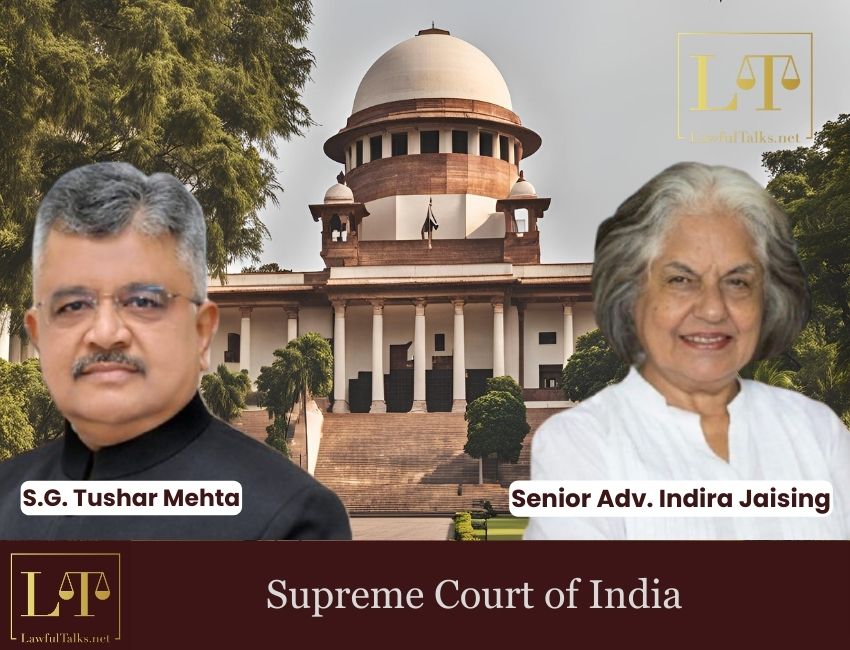Allahabad HC Sets Aside Afzal Ansari's Conviction, Allows Him to Continue as MP

The Supreme Court on January 20, 2025 witnessed a heated exchange between Solicitor General Tushar Mehta and Senior Advocate Indira Jaising regarding the procedure for senior advocate designations. The dispute arose when Mr. Mehta sought changes to the current system, which had been established by a three-judge Bench in 2017. However, he had not filed any formal application or petition challenging the existing procedure. Ms. Jaising immediately objected to his intervention, insisting that procedural norms be followed and expressing strong reservations about his oral submissions.

Ms. Jaising firmly opposed Mr. Mehta’s request, questioning the legitimacy of his intervention without a written application. She stated, “If Mr. Mehta wants changes, let him file an application in writing. Since when does this court entertain oral applications?” Expressing her concerns over what she saw as an informal approach, she further argued, “What I don’t understand is how the Solicitor General can walk into the court and make demands without a written application. Is there no procedure established by law in this courtroom? If I walked in and did the same, would your lordships allow it? You would not.”
Ms. Jaising also challenged Mr. Mehta on whose behalf he was making these submissions. Mr. Mehta responded, “I am appearing on behalf of the Union of India in a matter in which this issue has arisen.” However, Ms. Jaising remained firm, stating, “I insist that Solicitor General Tushar Mehta file an application stating the problem he finds with this designation system.”
The case before the Supreme Court initially concerned a convict’s plea for remission in a kidnapping case. However, during the proceedings, the Court identified broader issues, particularly regarding the role of Advocates-on-Record (AoRs) in filing false pleadings. Consequently, the Bench, comprising Justices AS Oka and Augustine George Masih, expanded the scope of the hearing to address three key aspects: the AoR system, the senior designation process, and the convict’s remission.
During the arguments, Mr. Mehta called for a reconsideration of the system governing senior advocate designations. He contended that the present procedure, introduced following the 2017 judgment, did not always reflect the judges’ true opinions due to pressures within the legal fraternity. Advocating for the reinstatement of full court voting by secret ballot, he submitted, “The full court must have a duty to vote by secret ballot.”
Ms. Jaising promptly countered this argument, reminding the Court that the 2017 judgment had already limited the use of secret ballots to exceptional circumstances. “This has been rejected by the court (in its 2017 judgment),” she asserted. Justice Oka appeared to concur, remarking, “Normally, there shouldn’t be a secret ballot. That’s what the Court says (in the 2017 judgment).” However, Mr. Mehta maintained his stance, urging a review of the system. “That again requires reconsideration,” he argued. “There should be a rule that it will be voted upon. Your lordships’ views about a candidate must be reflected. Sometimes the views are not capable of being reflected due to various reasons, such as fraternity, etc.”
Ms. Jaising, however, strongly opposed any such reconsideration, contending that Mr. Mehta’s proposal would effectively overturn the 2017 ruling. She firmly stated, “This is something I will contest till my last breath. He wants to scrap the entire judgment. He is essentially asking to scrap the entire judgment that laid down this system. The current system is objective. If Mr. Mehta thinks otherwise, he must explain what’s not working. It’s not my responsibility, nor that of SCAORA or SCBA, to fix this.” She further reiterated that any modification to the system must follow proper legal procedures. “Let him file a review application in writing,” she insisted.
Mr. Mehta acknowledged that he could not orally request a modification of the judgment, but he emphasized that the issue had now become relevant in this case. “I understand that I cannot orally ask for the judgment to be modified. But this is a case where the real question has arisen,” he argued.
Recognizing the procedural constraints, the Bench clarified that, as a Division Bench, it lacked the authority to review a decision made by a three-judge Bench. “We assure you that we are conscious of the limitations. At the highest, what we can do is record our concerns and place it before the Chief Justice to refer it to a larger bench,” Justice Oka stated. Mr. Mehta agreed, responding, “That is my prayer.”
Ms. Jaising did not object to referring the issue to a larger Bench but reiterated her opposition to Mr. Mehta’s informal approach. “The SG cannot simply walk into the Court and make arguments,” she maintained. Mr. Mehta took exception to her remarks, countering, “I am not just a stranger walking into this court.” However, Ms. Jaising persisted, asserting, “You are a stranger walking in.”
While the Bench acknowledged concerns about the senior designation process, it made it clear that it would not entertain Mr. Mehta’s oral submissions beyond recording its observations. “We are telling you that these are our concerns. We are exercising our power to express our concerns and, if necessary, refer them to the Chief Justice to constitute a larger bench. Take it as our concern. We will ignore what the Solicitor General has said,” Justice Oka remarked.
Source- News





























































































































































































































































































































































































































































































































































































































































































































































